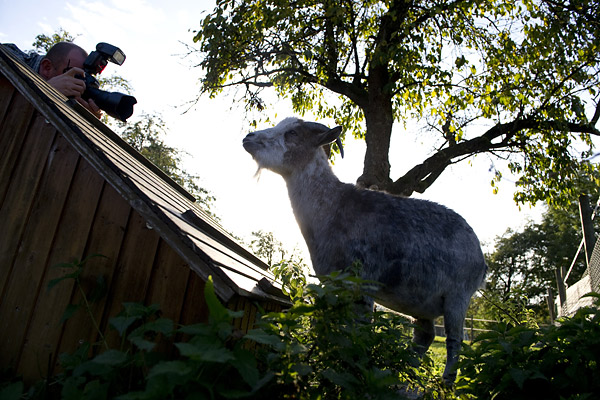
A photographer takes picture of Swiss far-right party SVP mascot, a goat named "Zottel", which was reported missing over the weekend, on October 18, 2011 in Otelfingen, near Zurich. (Sebastien Bozon / AFP / Getty Images)
The kidnapping of two goats may seem to have little relevance to politics. But then you realize the four-legged victims belong to the far-right Swiss People’s Party (SVP), which has built up massive support by scapegoating immigrants.
Zottel, the SVP’s official mascot, has come to symbolize the party’s anti-immigrant stance, and provided an endearing visual for a grossly xenophobic party platform. The SVP adopted the snow-white billie in 2007, after plastering the country with eye-catching posters that depicted a white sheep kicking a black sheep off the Swiss flag. Outraged by the party’s ultra-nationalism, members of a group called Anti Fascist Action stole Zottel and his sidekick Mimu on Oct. 15—a move intended to dent the SVP’s morale ahead of federal elections on Oct. 23. SVP officials recovered the animals earlier this week. “The dwarf goats were tied to a tree and painted in black,” the SVP said in a statement. “[The party] condemns the cowardly act by extremist delinquents.”
Now SVP’s leadership are interpreting the rescue as an omen of victory in this weekend’s election—yet another indicator of what appears a foregone conclusion. Opinion polls suggest the SVP could rake in 30% of the vote, well ahead of their nearest rivals the Socialists, who are polling around 20%. The SVP’s projected tally would be the highest for any party since Switzerland introduced its proportional voting system in 1919, and would eclipse its own record of 28.9%, set during the 2007 elections. Regardless of the exact figure, the party’s victory will likely solidify its place as the most stable of Europe’s right-wing parties.
The party’s unambiguous stance on immigration plays well in Switzerland, where 45% of people identify immigration as the most important issue facing the country. Earlier this week the SVP claimed it had obtained the requisite 100,000 signatures to proceed with a referendum on withdrawing Switzerland from freedom of travel arrangements with the E.U. That would allow the government to reimpose quotas on the number of foreigners—including asylum seekers and the relatives of immigrants—allowed to enter the Alpine state. “It is the mass of immigration that we are concerned about,” Silvia Baer, the party’s general secretary, told the Telegraph. “Over the last five years we’ve had about 380,000 immigrants come to this country – that’s about the population of the city of Zurich – and we are a small country of 7.8 million. This is going to create pressures, especially on the job market and the social security system.”
The SVP produced provocative campaign posters to feed those fears. In one a large black boot tramples the Swiss flag. An accompanying slogan says, “That’s enough. Stop mass immigration.” But provocation is nothing new for the party. In 2009, after launching a referendum to ban the construction of minarets on mosques, they splashed billboards with images of missiles shaped like minarets piercing through the flag, alongside a woman in a niqab. (More than 57% of voters subsequently supported the measure—despite the fact Switzerland only had four mosques at the time, and no history of Muslim militancy). In 2010 it pursued a referendum that would require the government to expel foreigners who commit serious crimes. That prompted them to put up controversial billboards that show a man who’s face is covered with the words, “Ivan S, rapist and soon to be Swiss?” Outrageous? Perhaps. But stunts like those have kept the populist SVP in the spotlight. A study conducted at the University of Bern found that of 8,000 online headlines tracked between June and mid-September, one-third referred to the party.
A strong showing by the SVP won’t dramatically alter the political landscape. Under Switzerland’s peculiar system of consensus government, the seven-member Federal Council acts as collective head of state. It must be made up of members from at least three parties, and currently includes two Social Democrats, two Liberals, one Christian Democrat, one Conservative Democrat and one member of the Swiss People’s Party. The best the SVP can hope for is the right to demand a second seat at the expense of one of the other parties. Should that happen, the SVP will have gotten Zottel—and the their rivals’ goat, too.
William Lee Adams is a staff writer at the London bureau of TIME. Find him on Twitter at @willyleeadams or on Facebook. You can also continue the discussion on TIME’s Facebook page and on Twitter at @TIME.

